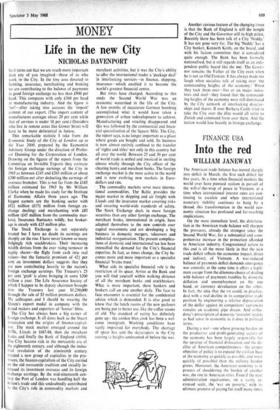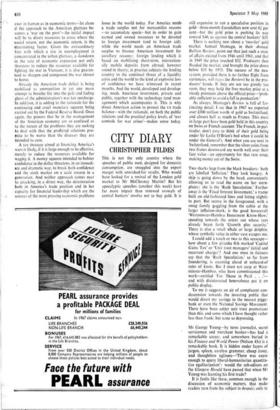Into the red
FINANCE USA WILLIAM JANE WAY
The American trade balance has moved sharply into deficit in March; the first such deficit for five years. At a time when financial markets the world over have pawned realism in pursuit' of the will-o'-the-wisp of peace in Vietnam, at a time when international interest rates are con- tinuing to escalate and when international monetary stability continues to hang by a thread, this transformation in the world eco- nomic situation has profound and far-reaching implications.
On the most immediate level, the deteriora- tion in the American trade balance will sharpen the pressures, already the strongest since the Second World War, for a substantial and com- prehensive increase in the protection afforded to American industry. Congressional action to this end is all the more likely in that the new trade deficit reflects the economic impact. direct and indirect, of Vietnam. A war-induced balance of payments deficit demands emergency war controls; at the same time it offers a legiti- mate escape from the dilemma-choice of dealing with balance of payments troubles by domestic deflation and unemployment on the one hand, or currency devaluation on the other. In fact, the idea that the us could, in practice, deal with a real decline in its competitive trade position by engineering a relative depreciation of the dollar against its competitors' currencies remains an academic pipe dream. And ortho- doxy's prescription of domestic 'restraint' makes as bad sense in economic as it does in political terms.
During a war—one whose growing burden on the productive and profit-generating sectors of the economy has been largely responsible for the upsurge of financial dislocation and the de- cline of American competitiveness—the proper objective of policy is to expand the civilian base of the economy as quickly as possible, and more quickly (if possible) than the military burden grows. Moreover, the American economy is in process of shouldering the burden of another war, the one in American cities. Even if the next administration regalvanises, on a vastly in- creased scale, the 'war on poverty,' with its ultimate promise of paying for itself many times ever in human as in economic terms—let alone if the approach to the American ghettoes be- comes a 'war on the poor'—the initial impact will be to divert resources to areas where the social return, not the economic return, is the determining factor. Given the extraordinary bias with which a rise in unemployment is concentrated in the urban ghettoes, a slowdown in the rate of economic expansion not only threatens to reduce the resources available for fighting the war in Vietnam; it is also guaran- teed to sharpen and compound the war closest to home.
Already the American trade deficit is being mobilised as ammunition in yet one more attempt to breathe life into the pale and fading ghost of the administration's war tax surcharge. In addition, it is adding to the rationale for the continuing and cruel monetary squeeze being carried out by the Federal Reserve Board. Once again, the powers that be in the management of the American economy are so confused as to the nature of the problems they are seeking to deal with that the proffered solutions pro- mise to be worse than the diseases they are intended to cure.
A tax increase aimed at financing America's wars is likely, if it is large enough to be effective, merely to reduce the resources available for waging it. A money squeeze intended to bolster confidence in the dollar threatens, in an immedi- ate and dramatic way, to break both confidence and the stock market on a scale unseen in a generation. And neither approach comes near to attacking, in a direct way, the deterioration both in America's trade position and in her capacity for financial leadership which are the sources of the most pressing economic problems loose in the world today. For America needs a trade surplus not for mercantilist reasons —to accumulate specie—but in order to gain earned and owned resources to be devoted to foreign investment (and to foreign aid), while the world needs an American trade surplus to finance American investment for corollary reasons : foreign lending which is based on mobilising short-term, internation- ally mobile deposits from abroad, however sound in theory, in practice subjects the lending country to the continual threat of a liquidity crisis and the world to the kind of explosive loss of confidence we have witnessed in recent months. And the world, developed and develop- ing, needs American investment, private and public, together with the technology (and man- agement) which accompanies it. This is why direct American action to protect the us trade balance—with the rationale, on both the public relations and the practical policy levels, of 'war controls for war crises'—makes sense today.







































 Previous page
Previous page